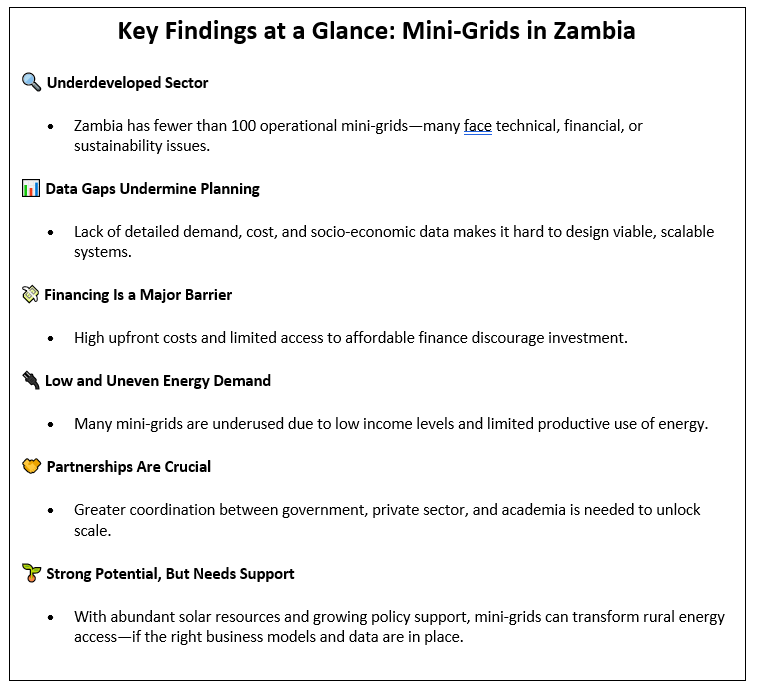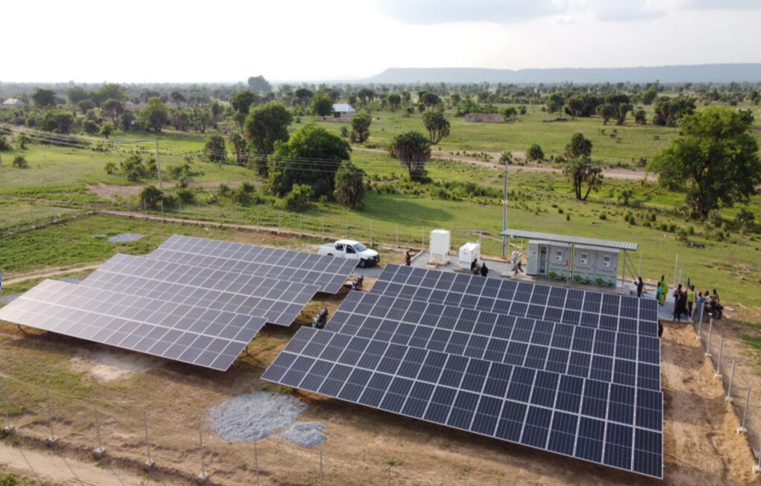Building Better Energy Futures: GRC supporting Bankable Mini-Grids in Zambia
Across Zambia, especially in rural areas, reliable electricity remains out of reach for many communities. The Scottish Global Renewables Centre (GRC) is helping change that—by building partnerships, sharing knowledge, and creating pathways to sustainable, scalable energy access through mini-grids.
As part of its commitment to global energy justice, the GRC recently completed a project exploring how to accelerate mini-grid deployment in Zambia. This work, delivered in partnership with Lloyds Financials Limited and Equal Access Energy, was supported by the Scottish International Science Partnership Fund. The resulting report—Building Partnerships to Accelerate Energy Access through Mini-Grids in Zambia—provides a deep dive into the state of the sector and offers practical guidance for making mini-grids more investable and impactful.
Why Mini-Grids?
Mini-grids—small, local energy systems often powered by solar—are a promising solution for rural electrification. In Zambia, where only about 14.5% of rural households are connected to the grid, mini-grids can play a vital role in powering homes, schools, businesses, and clinics.
But despite Zambia’s huge solar potential, the report found that the mini-grid sector remains underdeveloped. Many projects face challenges related to financial viability, limited demand, and insufficient data for planning.
Filling the Data Gap
A key takeaway from the project is the urgent need for better data. Effective mini-grid design relies on detailed information—about household energy demand, local businesses, income levels, and resource availability. Without this, systems may be oversized, underused, or financially unsustainable.
That’s why the GRC made data a central theme in its approach. The team carried out detailed mapping of Zambia’s mini-grid landscape, conducted interviews with stakeholders across the public and private sectors, and reviewed existing policies and funding sources.
From Research to Action: The Lusaka Workshop
In December 2024, the GRC and partners hosted a workshop in Lusaka to bring together developers, regulators, community leaders, and researchers to discuss “bankable business models” for mini-grids. The event highlighted the importance of collecting and analysing primary data, including the use of mobile data to understand consumer behaviour and electricity spending habits.
Stakeholders shared valuable lessons—from why mini-grids need stronger market linkages, to how Constituency Development Funds (CDFs) could be better used to support productive use of energy in rural communities.
Knowledge Exchange in Action
This work is part of a growing Community of Practice on Mini-Grids under the Scottish Global Renewables Centre. By fostering collaboration between academics, industry, and policymakers in both Scotland and Africa, the GRC is helping accelerate learning, share innovations, and co-create solutions for energy access challenges. The Centre’s mission goes beyond research—it’s about knowledge exchange. Whether through reports, workshops, or long-term partnerships, the GRC supports energy transitions that are grounded in local realities and informed by global expertise.

What’s Next?
The project laid out a clear path forward: improve business models, collect better data, build partnerships, and unlock investment. With continued support, Zambia can lead the way in demonstrating how decentralised renewable energy can power inclusive, climate-resilient development.
Want to learn more? Read the full report
Follow the GRC’s updates on community energy innovation around the world.
